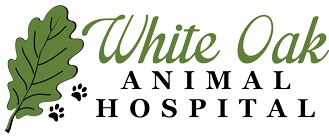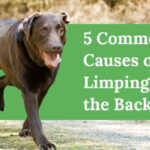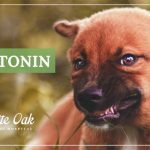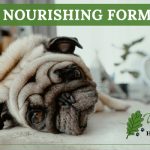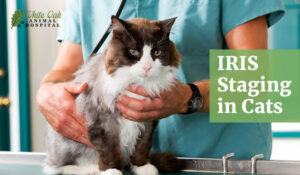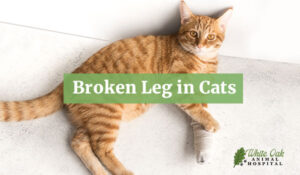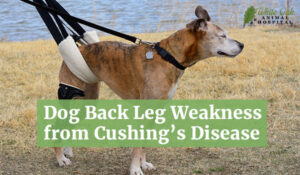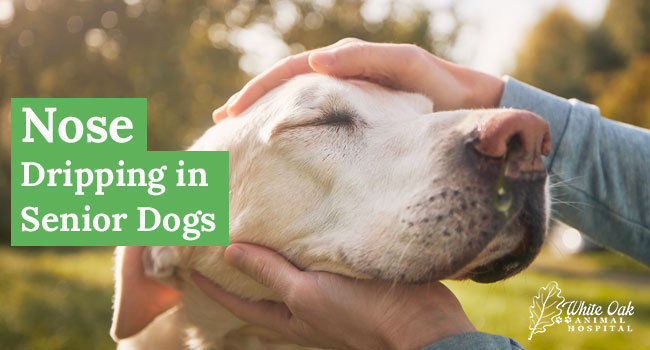
Nose dripping in senior dogs is very common. This phenomenon is often considered a typical sign of aging. As canines reach their senior years, pet parents often dismiss minor nose dripping as a senior dog issue. However, while some nasal drippage may be expected, abnormal drainage can signal severe health conditions in elderly pets. It is critical for owners to closely monitor nose dripping in senior dogs and recognize when to pursue veterinary help.
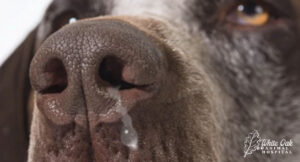 This article aims to help pet owners distinguish between normal and abnormal nasal discharge in senior dogs. By discussing the six most likely reasons for nose dripping in older dogs, readers will understand potential health issues that may affect their aging pets. Additionally, the article offers practical tips for monitoring their dogs at home, enabling pet owners to notice subtle changes in their dog’s nasal behavior.
This article aims to help pet owners distinguish between normal and abnormal nasal discharge in senior dogs. By discussing the six most likely reasons for nose dripping in older dogs, readers will understand potential health issues that may affect their aging pets. Additionally, the article offers practical tips for monitoring their dogs at home, enabling pet owners to notice subtle changes in their dog’s nasal behavior.
Recognizing the importance of timely action, the piece guides pet parents on when to seek veterinary help for a runny nose in their senior dogs. By promoting awareness and understanding, this article provides owners with the information necessary to prioritize the health and well-being of their older canine companions.
Normal vs. Abnormal Nasal Discharge
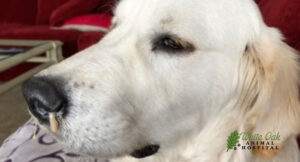 In older dogs, it’s usually normal to see a clear and watery discharge from one or both nostrils, especially if it happens now and then. However, if the nose dripping in senior dogs becomes bloody, thick, discolored, foul-smelling, or constant, it’s not normal, and they need to see a vet immediately. If the nose dripping in senior dogs affects only one nostril, it might suggest problems like a foxtail or grass awn stuck in there, a tooth root abscess, or other issues that need quick attention.
In older dogs, it’s usually normal to see a clear and watery discharge from one or both nostrils, especially if it happens now and then. However, if the nose dripping in senior dogs becomes bloody, thick, discolored, foul-smelling, or constant, it’s not normal, and they need to see a vet immediately. If the nose dripping in senior dogs affects only one nostril, it might suggest problems like a foxtail or grass awn stuck in there, a tooth root abscess, or other issues that need quick attention.
Even though older pets often have a bit of irritation in their noses and eyes, significant sneezing, nasal swelling, or noticeable changes in tissue should not be treated as regular signs of aging. Owners are essential in telling apart the usual runny nose that comes with age and more worrying signs that might mean sickness in their older dogs. Staying alert to these differences is crucial to ensuring nose dripping in senior dogs gets the proper medical care at the right time for potential health problems.
6 Common Causes of Nose Dripping in Senior Dogs
Dental Disease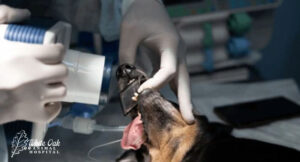
Advanced dental disease, often underdiagnosed in mature pets, can manifest as loose or missing teeth, oral pain, offensive breath, and facial swelling. These signs point to possible infection lurking beneath the gums. Full mouth dental X-rays are essential for identifying the extent of the issue, allowing for professional veterinary cleanings and, if necessary, tooth extractions to restore oral health and prevent further complications.
Allergies
Respiratory allergies in dogs can trigger a cascade of reactions, including itchy skin, chronic ear infections, and frequent sneezing. These, in turn, can lead to secondary nose dripping in senior dogs due to irritated nasal passages. Food allergies, conversely, can induce excessive paw licking, with the constant saliva washing causing facial drippage. Allergy testing, coupled with elimination diet trials, helps pinpoint specific triggers, enabling targeted immunotherapy and allergen avoidance strategies to provide lasting relief.
Foreign Objects
The sudden onset of one-sided nose dripping in senior dogs could indicate an inhaled foreign object, such as foxtail, grass seed, or blade of grass, lodged within the nasal passages or sinuses. These irritants are often identified through imaging tests or direct visual inspection by veterinarians using specialized scopes. Prompt removal of the foreign object is crucial to prevent significant infections.
Fungal Infections
Heavily pigmented nasal discharge and crusty lesions inside the nose or on the nasal planum (bare skin around the nostrils) can indicate a systemic fungal infection. Fungal culture of nasal discharge or skin biopsies offers diagnostic confirmation, while extended courses of prescription antifungal medications aim to eradicate the infection long-term.
Tumors
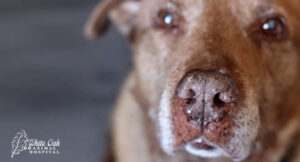 The development of facial lumps or bumps, blood-tinged nasal discharge, tissue thickening, and loss of facial symmetry raise concerns about potentially cancerous changes. Fine needle aspirates and biopsy samples are crucial in allowing veterinary pathologists to determine whether such growths are benign or malignant. Depending on the diagnosis, treatment recommendations can include surgical excision, radiation therapy, or chemotherapy protocols.
The development of facial lumps or bumps, blood-tinged nasal discharge, tissue thickening, and loss of facial symmetry raise concerns about potentially cancerous changes. Fine needle aspirates and biopsy samples are crucial in allowing veterinary pathologists to determine whether such growths are benign or malignant. Depending on the diagnosis, treatment recommendations can include surgical excision, radiation therapy, or chemotherapy protocols.
Tissue Changes
As the body ages, specific tissues naturally degrade and lose their original shape, thickness, and protective functions. In the nose of senior dogs, the scroll-like bones and cartilage can dissolve over time, increasing the risk of nasal congestion, obstruction, and discharge. Maintaining proper humidity levels in the home environment and avoiding known irritants can help reduce associated discomfort.
It’s important to remember that nose dripping in senior dogs is a complex issue with various potential causes. By seeking prompt veterinary care, understanding the underlying factors, and implementing appropriate treatment and supportive care measures, pet owners can help ensure their beloved companions enjoy optimal respiratory health and a comfortable golden age.
When to Visit the Vet
When it comes to managing nose dripping in senior dogs, diligent observation plays a pivotal role in maintaining the health and well-being of your senior canine companion. Pay careful attention to the quantity and appearance of nasal discharge, noting the presence of blood or any unpleasant odor. Document whether the drainage originates from one nostril or both, and keep track of how frequently your senior dog experiences sneezing bouts, evaluating whether nose dripping intensifies afterward.
Monitor for signs of discomfort, such as open-mouth breathing, coughing, or retching, which may indicate obstructed airflow or nausea. Additionally, closely observe changes in appetite, energy levels, breathing rate, and overall demeanor, as subtle shifts could be early indicators of underlying health issues.
 Compiling clear and detailed documentation of these symptoms is essential for providing veterinary professionals valuable insights into your senior dog’s condition. Serially capturing photos of muzzle changes, accompanied by descriptive notes, aids veterinary teams in pinpointing specific details and trends related to nose dripping in senior dogs.
Compiling clear and detailed documentation of these symptoms is essential for providing veterinary professionals valuable insights into your senior dog’s condition. Serially capturing photos of muzzle changes, accompanied by descriptive notes, aids veterinary teams in pinpointing specific details and trends related to nose dripping in senior dogs.
While occasional clear discharge might be considered normal in mature dogs, seeking prompt veterinary attention is crucial if it takes on a bloody, thick, or purulent appearance. This becomes especially critical in elevated sneezing frequencies, persistent bacterial or yeast infections, facial pain, swelling, or a noticeable decline in appetite and enthusiasm for life. A thorough veterinary examination is warranted if mild nasal symptoms persist beyond 7-10 days without improvement.
With over 28 years of experience at White Oak Animal Hospital, Dr. Casey Damron specializes in assessing nose dripping in senior dogs and diagnosing its root causes in aging dogs. Utilizing state-of-the-art testing methods, he explores interconnected factors contributing to runny noses, ranging from infections to irritation, injury, inflammation, and potential tumor formation. Dr. Damron is dedicated to developing tailored therapeutic plans that ensure lasting relief and comfort for senior dogs, addressing the unique complexities of their health situations.
Caring for Your Senior Dog’s Runny Nose
A runny nose in senior dogs, a condition often disregarded as a typical sign of aging, can sometimes mask a more serious underlying issue. While minor, intermittent nose dripping in senior dogs may not cause immediate concern, persistent discharge warrants veterinary attention, especially if it’s bloody or foul-smelling.
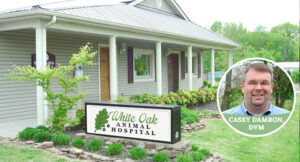 Dr. Damron, a skilled veterinarian, takes a comprehensive approach to diagnosing and treating nose dripping in senior dogs. He delves deeper than age-related explanations, exploring potential causes ranging from infections and inflammation to tumor formation. His diagnostic process utilizes various tools and techniques to ensure an accurate understanding of the root cause of your senior dog’s nasal discharge.
Dr. Damron, a skilled veterinarian, takes a comprehensive approach to diagnosing and treating nose dripping in senior dogs. He delves deeper than age-related explanations, exploring potential causes ranging from infections and inflammation to tumor formation. His diagnostic process utilizes various tools and techniques to ensure an accurate understanding of the root cause of your senior dog’s nasal discharge.
Dr. Damron aims to provide prompt relief and comfort for your senior dog. He understands that a runny nose can significantly impact their quality of life, and he strives to restore their ability to nose-breathe easily and enjoy their golden years. Remember, persistent or concerning nose dripping in senior dogs should not be ignored. By seeking timely veterinary care and implementing supportive measures at home, you can ensure your beloved senior dog receives the necessary treatment and enjoys a comfortable and healthy life.
Related Posts
-
5 Common Causes of Dog Limping on the Back Leg: A Comprehensive Guide
A dog limping on the back leg is a concerning and prevalent issue among pet…
-
How Melatonin for Dogs Promotes Relaxation
Just like people, dogs experience stress for a number of reasons. Some dogs feel nervous…
-
Benefits of Spirulina Supplements For Dogs
s Will spirulina supplements benefit your dog? Well, just like people, sometimes pets experience dips…
-
Why Herbal Treatment May Benefit Hypothyroidism In Dogs
Do you have personal experience with hypothyroidism in dogs? If a veterinarian has diagnosed your…
